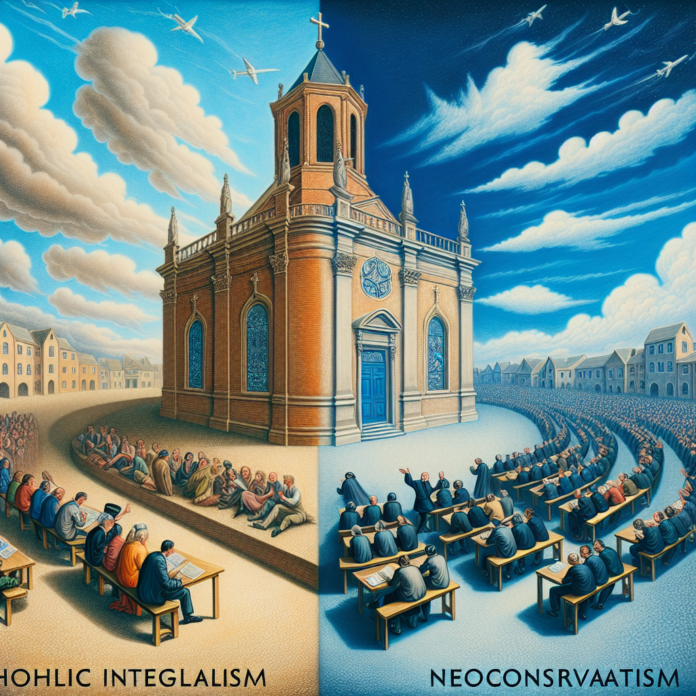Navigating the Shifting Sands: Catholic Integralism versus Neoconservative Democracy
The debate over the appropriate balance between religious conviction and government principles has been a longstanding and contentious issue. Two perspectives in this discourse are Catholic Integralism and Neoconservative Democracy. The former advocates a state governed by Catholic doctrines, while the latter supports modern democratic principles infused with a cautious approach to liberalism. As we examine these ideologies, it becomes clear that one offers a path rooted in regressive and authoritarian tendencies, while the other provides opportunities for progress and flexibility in governance.
Catholic Integralism attempts to marry theological absolutism with the mechanisms of the state. Integralists argue for the primacy of religious law over secular principles, suggesting that moral governance can only be achieved through adherence to Catholic doctrines. This approach hearkens back to the Middle Ages, a period when the Catholic Church wielded significant temporal power, such as in the Papal States or during the era of Christendom. During these times, state and church were enmeshed, leading to social structures where deviations from accepted religious dogma — heresy, apostasy, and even scientific innovation contrary to church teachings — were met with severe consequences.
In contrast, Neoconservatives recognize the value of separating church and state, aiming to foster a society where diverse beliefs can coexist within a framework of democratic governance. Emerging in response to the liberal reforms of the mid-20th century, Neoconservative thought emphasizes practical government policies that promote economic freedom, a robust national defense, and moral clarity. However, it stops short of endorsing theocratic control. Neoconservatives argue that democracy, despite its imperfections, allows for adaptability and self-correction in ways that an integrally governed state cannot achieve.
Historically, the authoritarian streak within Catholic Integralism is troubling. The Inquisition, endorsed by the Catholic Church, serves as a grim reminder of the excesses born from intertwining rigid religious dogma with governance. This period saw thousands persecuted for their beliefs, subjected to torture, forced confessions, and executions, all in the name of religious purity. It is an epoch that historians and ethical scholars alike view with horror, illustrating the dark potential of a state that prioritizes dogmatic uniformity over human rights and fairness.
Moreover, Catholic Integralism has historically shown itself to be resistant to progress and development. Consider the condemnation of Galileo Galilei, whose support for heliocentrism — a scientifically valid perspective — was vehemently opposed and punished by the Catholic Church. An integralist state is inherently inflexible, often rejecting new knowledge and ideas that contradict religious teachings.
Neoconservative democracy, by contrast, values individual liberties, including freedom of speech, freedom of religion, and the right to dissent. These principles ensure that society benefits from the free exchange of ideas, which is crucial for intellectual and scientific advancements. While Catholic Integralists may argue that a moral society must align cognizantly with religious tenets, Neoconservatives maintain that morality and ethics can be fostered through laws that protect individual rights and social justice within a pluralistic society.
On an economic front, Catholic Integralism’s historical inclination often leaned towards feudal systems. Feudalism, underlined by a rigid hierarchy and minimal social mobility, is antithetical to modern economic growth and innovation. In stark contrast, Neoconservative principles aim to harmonize free-market capitalism with social policies that ensure a safety net for the vulnerable, believing that economic freedom drives progress and prosperity.
Contemporary global society, with its multiculturalism and rapid technological advancements, requires a governance model that can evolve and adapt. Neoconservatives support institutions and policies that promote these values, recognizing that a pluralistic democracy, while complex and occasionally fractious, is best equipped to handle modern challenges. Catholic Integralism, with its roots in medievalist autocracy, offers a static and anachronistic model ill-suited for today’s dynamic world.
Critics of Neoconservatives might suggest that their approach can sometimes veer towards excessive interventionism, both domestically and internationally. However, unlike Catholic Integralists, who espouse a return to a bygone era of purported religious uniformity, Neoconservatives are ultimately committed to the framework of democracy and the rule of law. This commitment provides a mechanism for course correction and reform, something that is conspicuously absent in an integralist state.
In conclusion, contrasting Catholic Integralism’s vision of a state governed by Catholic doctrines with Neoconservativism’s support for modern democratic principles highlights a crucial question: should society prioritize dogmatic uniformity at the risk of suppression and stagnation, or embrace a flexible, democratic approach that allows for growth and the safeguarding of individual liberties? History and reason both suggest that the latter offers a more humane and progressive future, demonstrating why traditionalism, in its most rigid forms, is best left behind.
